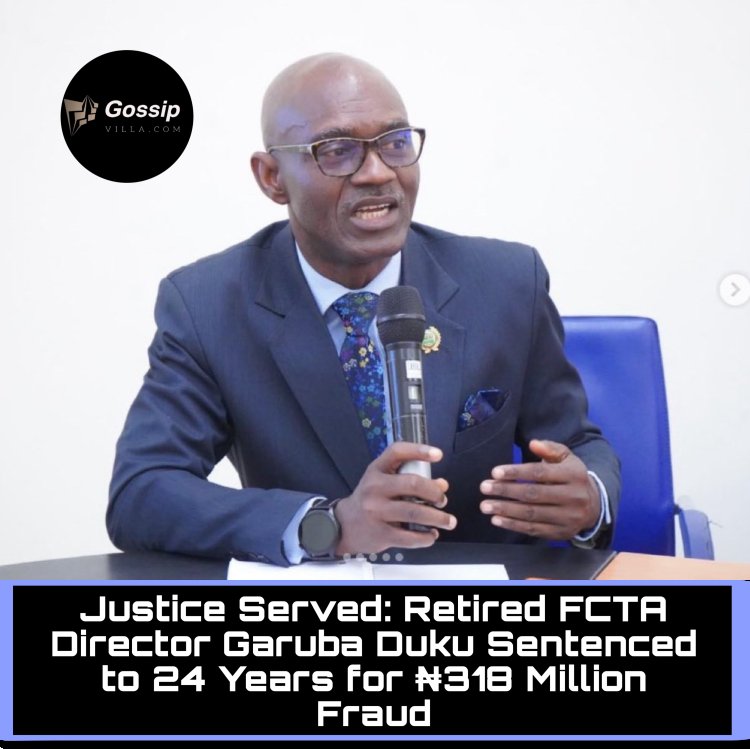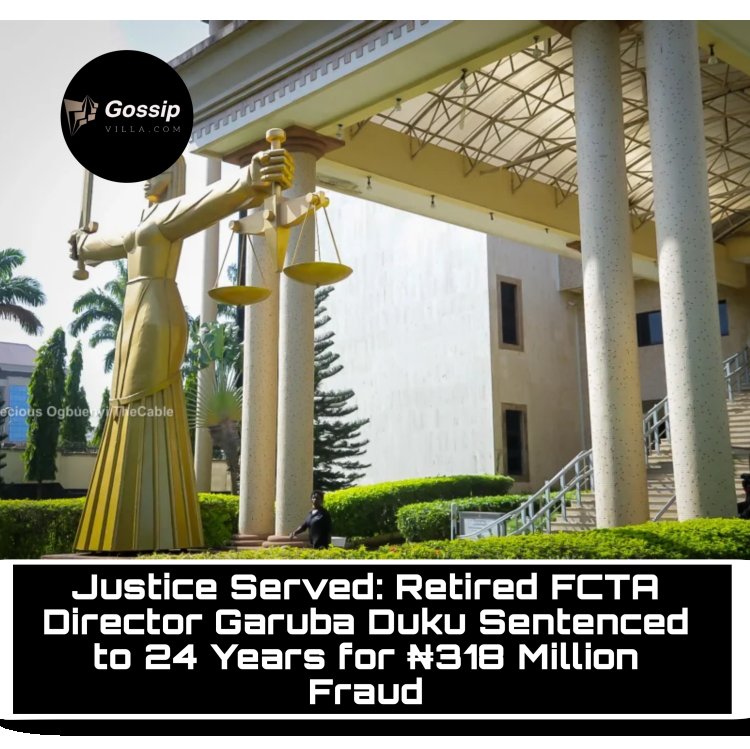Retired FCTA Director Garuba Duku Sentenced to 24 Years for ₦318 Million Fraud
Federal High Court in Abuja has sentenced Mr. Garuba Duku, a retired Director of Finance and Administration with the Abuja Metropolitan Management Council (AMMC) under FCTA, to 24 years in prison for diverting ₦318 million in public funds.

Justice Served: Retired FCTA Director Garuba Duku Sentenced to 24 Years for ₦318 Million Fraud
In a ruling that underscores Nigeria’s ongoing battle against corruption, the Federal High Court in Abuja has handed down a stern 24-year prison sentence to Mr. Garuba Mohammed Duku, a retired Director of Finance and Administration at the Abuja Metropolitan Management Council (AMMC) under the Federal Capital Territory Administration (FCTA). The conviction, secured by the Independent Corrupt Practices and Other Related Offences Commission (ICPC), revolves around the diversion of ₦318 million in public funds between 2012 and 2013. This case serves as a powerful reminder of the consequences of financial misconduct in public office and the relentless pursuit of accountability by anti-graft agencies.
The judgment was delivered on October 3, 2025, by Justice James Omotosho, who found Duku guilty on all six counts of corruption and money laundering filed under suit number FHC/ABJ/CR/608/2022. According to ICPC investigations, Duku fraudulently transferred ₦318,250,000 from AMMC’s accounts into his personal Fidelity Bank account, an act that blatantly violated public finance regulations and constituted a grave abuse of office. The court emphasized that the prosecution proved its case beyond reasonable doubt, dismissing Duku’s defense that the funds were disbursed on instructions from superiors due to a complete lack of supporting evidence.

This isn’t just another statistic in Nigeria’s fight against corruption; it’s a story of betrayal at the heart of public service. The AMMC, tasked with maintaining the infrastructure and aesthetics of Nigeria’s capital city, relies on taxpayer money to function effectively. Diverting such a massive sum undermines essential services like road maintenance, waste management, and urban planning in Abuja—a city that symbolizes the nation’s progress. Imagine the hospitals, schools, or public projects that could have benefited from those funds. Instead, they vanished into private pockets, leaving a trail of financial impropriety that the ICPC meticulously unraveled.
The trial itself was a testament to the ICPC’s thorough investigative prowess. Over the course of proceedings, the commission presented compelling witness testimonies, bank records, and exhibits that painted a clear picture of deliberate fraud. Duku, who held a position of immense trust as the director overseeing finances, allegedly siphoned the money through unauthorized transfers, exploiting his authority to bypass checks and balances. His claim of acting under superior orders fell flat in court, as no documents, receipts, or affidavits from those alleged superiors materialized to corroborate his story. Justice Omotosho, in his detailed ruling, described the actions as a “deliberate attempt to defraud the government,” highlighting how such behaviors erode public confidence in institutions meant to serve the people.
Under the sentencing, Duku faces four years imprisonment on each of the six counts, totaling 24 years if served consecutively. However, in a nod to leniency—considering his clean prior record and a defense plea for mercy—the judge ordered the terms to run concurrently, effectively reducing the actual time behind bars to four years, commencing from October 3, 2025. He is to serve at the Kuje Correctional Centre in Abuja if he opts for jail time. Alternatively, Duku has the option to pay a staggering fine of approximately ₦1.6 billion—five times the diverted amount per count to avoid prison altogether. This dual option not only aims to recover losses for the public purse but also sends a financial deterrent to potential wrongdoers.
Corruption in Nigeria’s public sector remains a persistent thorn, with Transparency International’s 2024 Corruption Perceptions Index ranking the country 145 out of 180 nations, scoring a dismal 25/100. High-profile cases like this one involving Duku echo larger scandals, such as the infamous Dasuki arms deal or the more recent convictions in the Niger Delta Development Commission frauds. These incidents reveal systemic vulnerabilities: weak internal audits, political interference, and a culture of impunity that allows officials to treat public funds as personal piggy banks. The ICPC’s role here is crucial; established under the Corrupt Practices Act of 2000, the agency has ramped up prosecutions in recent years, securing over 1,500 convictions since inception, including several multi-million-naira frauds in the FCTA alone.
What does this mean for the average Nigerian?
It’s a beacon of hope amid despair. When justice is swift and visible, it discourages others from similar paths. The ICPC’s Director of Public Enlightenment, Demola Bakare, reiterated in a post-judgment statement that “no one is above the law,” urging public servants to uphold integrity. Yet, challenges persist. Critics argue that concurrent sentencing dilutes the punishment’s impact, potentially emboldening white-collar criminals who can afford fines. Moreover, recovering the ₦318 million remains key, will it be clawed back through asset forfeiture, or will it join the long list of unrecovered looted funds?
Looking ahead
This verdict could catalyze reforms. Strengthening whistleblower protections, digitizing financial transactions for real-time monitoring, and mandatory asset declarations for public officials are steps that could prevent future Duku-like scandals. The FCTA, in particular, might review its procurement and approval processes to plug loopholes exposed in this case. For citizens, it’s a call to action: report suspicions via ICPC hotlines and demand transparency from leaders.
In conclusion
The sentencing of Garuba Duku is more than a courtroom finale; it’s a chapter in Nigeria’s redemption arc against graft. While four years may seem light for such a heinous act, the precedent it sets is heavy. It affirms that accountability will catch up, no matter how long it takes. As Abuja continues to grow as Africa’s diplomatic hub, cases like this ensure that its foundations built on public trust and resources remain unshakeable. Let’s hope this sparks a ripple effect, turning the tide against corruption one verdict at a time.
News Source
What's Your Reaction?




















